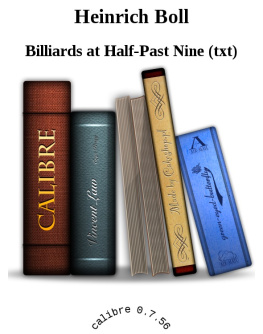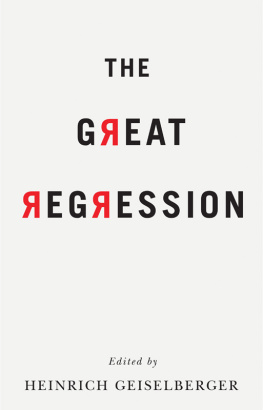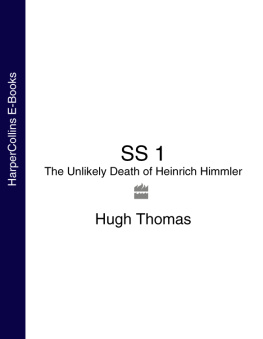Heinrich Böll - The Train Was On Time (The Essential Heinrich Böll)
Here you can read online Heinrich Böll - The Train Was On Time (The Essential Heinrich Böll) full text of the book (entire story) in english for free. Download pdf and epub, get meaning, cover and reviews about this ebook. year: 2011, publisher: Melville House, genre: Art. Description of the work, (preface) as well as reviews are available. Best literature library LitArk.com created for fans of good reading and offers a wide selection of genres:
Romance novel
Science fiction
Adventure
Detective
Science
History
Home and family
Prose
Art
Politics
Computer
Non-fiction
Religion
Business
Children
Humor
Choose a favorite category and find really read worthwhile books. Enjoy immersion in the world of imagination, feel the emotions of the characters or learn something new for yourself, make an fascinating discovery.

- Book:The Train Was On Time (The Essential Heinrich Böll)
- Author:
- Publisher:Melville House
- Genre:
- Year:2011
- Rating:5 / 5
- Favourites:Add to favourites
- Your mark:
- 100
- 1
- 2
- 3
- 4
- 5
The Train Was On Time (The Essential Heinrich Böll): summary, description and annotation
We offer to read an annotation, description, summary or preface (depends on what the author of the book "The Train Was On Time (The Essential Heinrich Böll)" wrote himself). If you haven't found the necessary information about the book — write in the comments, we will try to find it.
The Train Was On Time (The Essential Heinrich Böll) — read online for free the complete book (whole text) full work
Below is the text of the book, divided by pages. System saving the place of the last page read, allows you to conveniently read the book "The Train Was On Time (The Essential Heinrich Böll)" online for free, without having to search again every time where you left off. Put a bookmark, and you can go to the page where you finished reading at any time.
Font size:
Interval:
Bookmark:
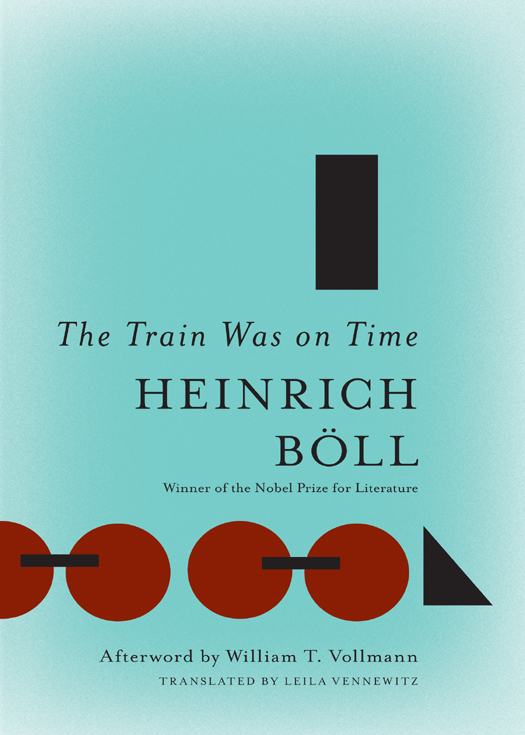
In 1972, Heinrich Bll became the first German to win the Nobel Prize for literature since Thomas Mann in 1929. Born in Cologne, in 1917, Bll was reared in a liberal Catholic, pacifist family. Drafted into the Wehrmacht, he served on the Russian and French fronts and was wounded four times before he found himself in an American prison camp. After the war he enrolled at the University of Cologne, but dropped out to write about his shattering experiences as a soldier. His first novel, The Train Was on Time, was published in 1949, and he went on to become one of the most prolific and important of post-war German writers. His best-known novels include Billiards at Half-Past Nine (1959), The Clown (1963), Group Portrait with Lady (1971), and The Safety Net (1979). In 1981 he published a memoir, Whats to Become of the Boy? or: Something to Do with Books. Bll served for several years as the president of International P.E.N. and was a leading defender of the intellectual freedom of writers throughout the world. He died in June 1985.
William T. Vollmann is the author of seven novels, three collections of stories, and a seven-volume critique of violence, Rising Up and Rising Down, which was a finalist for the National Book Critics Circle Award in nonfiction. He is also the author of Poor People, a worldwide examination of poverty through the eyes of the impoverished; Riding Toward Everywhere, an examination of the train-hopping hobo lifestyle; and Imperial, a panoramic look at one of the poorest areas in America. His most recent novel, Europe Central, won the National Book Award in 2005. He has won the PEN Center USA West Award for Fiction, a Shiva Naipaul Memorial Prize and a Whiting Writers Award. His journalism and fiction have been published in The New Yorker, Esquire, Spin and Granta. Vollmann lives in California.
HEINRICH BLL
The Clown
The Safety Net
Billiards at Half-Past Nine
The Train Was on Time
Irish Journal
Group Portrait with Lady
Whats to Become of the Boy? Or:
Something to Do with BooksA Memoir
The Collected Stories of Heinrich Bll
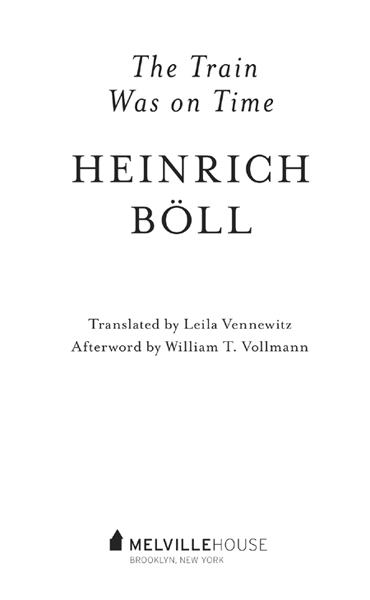
Translators Acknowledgment
I am deeply indebted to my husband, William Vennewitz, for his never-failing advice and assistance in this translation.
Leila Vennewitz
The Train Was On Time
Originally published in German in 1949 as Der Zug war pnklich by Heinrich Bll
1977, 1996, 2003 by Verlag Kiepenheuer & Witsch GmbH & Co. KG, Cologne, Germany
Translated by Leila Vennewitz.
Afterword William T. Vollmann, 2010
Melville House Publishing
145 Plymouth Street
Brooklyn, NY 11201
www.mhpbooks.com
Library of Congress Cataloging-in-Publication Data
Bll, Heinrich, 1917-1985.
[Zug war pnktlich. English]
The train was on time / Heinrich Bll; translated from the German by Leila Vennewitz.
p. cm.
Previously published: London : Secker and Warburg, 1970. With new afterword by William T. Vollmann.
eISBN: 978-1-935554-95-0
1. World War, 1939-1945Fiction. 2. GermanyFiction. I. Vennewitz, Leila. II. Title.
PT2603.O394Z4513 2011
833.914dc22
2011000503
v3.1
WAS ON TIME
AFTERWORD
by William T. Vollmann
I have known many adventures in my time: the creation of postal routes, Sahara rebellions, South America but war is not really an adventure at all, it is only a substitute for adventure. War is a disease. Like typhus.
Antoine de Saint-Exupry,
Pilote de Guerre
As they walked through the dark underpass they could hear the train rumbling up to the platform overhead, and the resounding voice came smoothly over the loudspeaker: The troop-train now arriving from Paris will depart for Przemysl via.
Then they had climbed the steps to the platform and were standing by the leave-train from which beaming soldiers were emerging, weighed down with huge packages. The platform quickly emptied, it was the usual scene. At some of the windows stood girls or women or a very silent, grim-faced father and the resounding voice was telling people to hurry. The train was on time.
Why dont you get on? the chaplain asked the soldier anxiously.
Get on? asked the soldier, amazed. Why, I might want to hurl myself under the wheels, I might want to desert eh? Whats the hurry? I might go crazy, Ive a perfect right to, Ive a perfect right to go crazy. I dont want to die, thats whats so horriblethat I dont want to die. His voice was cold and hard, as if the words were pouring from his lips like ice. Dont say any more! Ill get on all right, theres always a spot somewhere yes yes, dont mind me, pray for me! He grasped his pack, boarded the train through the nearest door, let down the window from inside, and leaned out, while overhead the resounding voice hung like a cloud of mucus: The train is now leaving.
I dont want to die! he shouted. I dont want to die, but the terrible thing is that Im going to die soon! The black figure on that cold gray platform retreated farther and farther into the distance farther and farther, until the station was swallowed up by night.
Now and again what appears to be a casually spoken word will suddenly acquire a cabalistic significance. It becomes charged and strangely swift, races ahead of the speaker, is destined to throw open a chamber in the uncertain confines of the future and to return to him with the deadly accuracy of a boomerang. Out of the smalltalk of unreflecting speech, usually from among those halting, colorless goodbyes exchanged beside trains on their way to death, it falls back on the speaker like a leaden wave, and he becomes aware of the force, both frightening and intoxicating, of the workings of fate. To lovers and soldiers, to men marked for death and to those filled with the cosmic force of life, this power is sometimes given, without warning; a sudden revelation is conferred on them, a bounty and a burden and the word sinks, sinks down inside them.
As Andreas was slowly groping his way back into the center of the car, the word soon entered him like a bullet, painlessly and almost imperceptibly penetrating flesh, tissue, cells, nerves, until at some point it caught, like a barbed hook, exploded, and ripped open a savage wound, making blood pour out life, pain.
Soon, he thought, and felt himself turning pale. At the same time he did all the usual things, almost unconsciously. He struck a match, lighting up the heaps of sitting, stretched out, sleeping soldiers who lay around, across, under, and on top of their luggage. The smell of stale tobacco smoke was mixed with the smell of stale sweat and that strangely gritty dirt which clings to all soldiers in the mass. The flame of the dying matchstick flared up with a final hiss, and in that last glow he saw, over by the narrowing corridor, a small empty space. He carefully picked his way toward it, his bundle tucked under one arm, his cap in his hand.
Soon, he thought, and the shock of fear lay deep, deep. Fear and absolute certainty. Never again, he thought, never again will I see this station, never again the face of my friend, the man I abused right up to the last moment never again. Soon! He reached the empty space, set his pack carefully on the floor in order not to wake the sleeping men around him, and sat down on it so he could lean back against a compartment door. Then he tried to arrange his legs as comfortably as possible; he stretched the left one carefully past the face of one sleeping soldier, and placed the right one across a piece of luggage that was shielding the back of another. In the compartment behind him a match flared up, and someone began to smoke silently in the dark. By turning slightly to one side he could see the glowing tip of the cigarette, and sometimes, when the unknown man drew on it, the reflection spread over an unfamiliar soldiers face, gray and tired, with bitter creases in it, starkly and terribly sober.
Font size:
Interval:
Bookmark:
Similar books «The Train Was On Time (The Essential Heinrich Böll)»
Look at similar books to The Train Was On Time (The Essential Heinrich Böll). We have selected literature similar in name and meaning in the hope of providing readers with more options to find new, interesting, not yet read works.
Discussion, reviews of the book The Train Was On Time (The Essential Heinrich Böll) and just readers' own opinions. Leave your comments, write what you think about the work, its meaning or the main characters. Specify what exactly you liked and what you didn't like, and why you think so.

